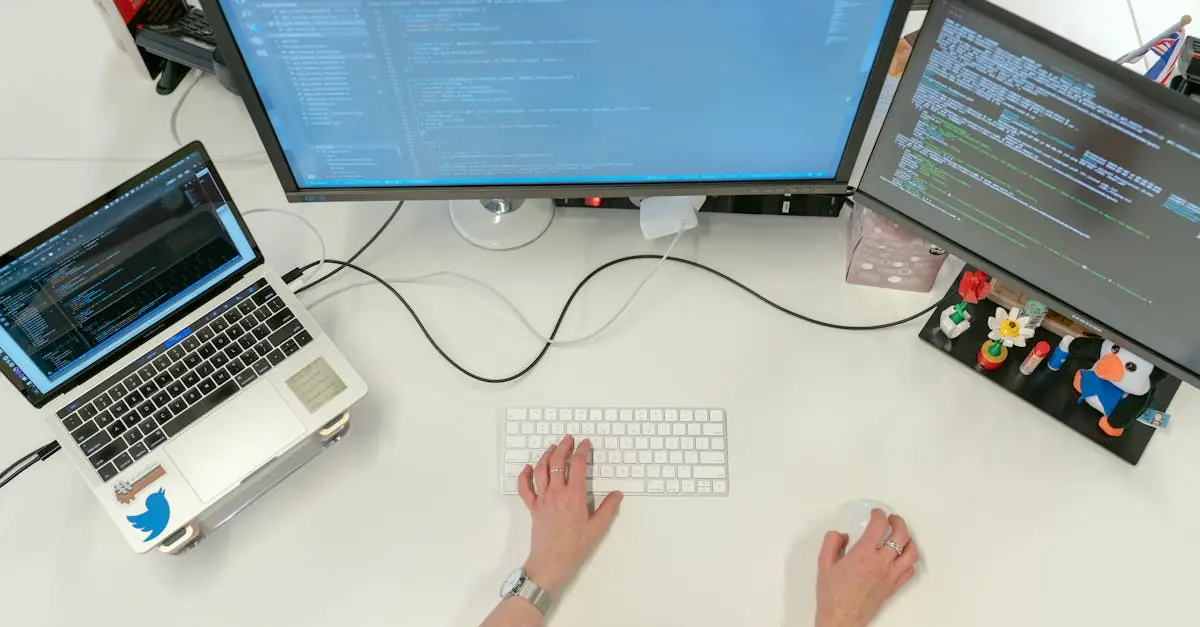In today’s tech-driven world, a Master’s in Software Engineering isn’t just a degree; it’s a golden ticket to the coding carnival. Imagine diving into a realm where algorithms dance and debugging is a sport. With every line of code, one can build apps that make life easier or create programs that could potentially take over the world—no pressure!
Table of Contents
ToggleOverview of Masters Software Engineering
A Master’s in Software Engineering equips students with advanced skills in software development and project management. This degree emphasizes real-world applications, preparing graduates for various roles in the tech industry. Key topics include software architecture, design patterns, and agile methodologies.
Students can expect to engage in hands-on projects that simulate actual industry scenarios. Programs typically consist of a mix of coursework, practical experience, and capstone projects. Exposure to cutting-edge technologies enhances the learning experience.
Employers value graduates for their capability to integrate software engineering principles into practical applications. Specializations within this degree often cover areas such as cybersecurity, cloud computing, and mobile applications. These concentrations enable students to tailor their education to meet specific career goals.
Networking opportunities abound through group projects and collaborations with industry experts. Many institutions offer internship programs that provide valuable industry experience and connections. Graduates frequently report improved job prospects and higher salaries upon completion of their degree.
In addition, online and hybrid options allow for flexibility while pursuing this degree. Access to a diverse range of resources and support systems fosters a conducive learning environment. Ultimately, a Master’s in Software Engineering opens doors to numerous career paths in the tech landscape.
Core Curriculum
A Master’s in Software Engineering consists of a well-rounded core curriculum that equips students with essential skills and knowledge for the tech industry. This curriculum includes a blend of required and elective courses designed to enhance expertise.
Required Courses
Core courses focus on foundational subjects crucial for software development. Topics encompass software architecture, design patterns, and data structures. Students engage in programming languages such as Java, Python, or C++, directly applicable to real-world projects. Project management methodologies, including agile practices, form another key component. Additionally, courses in software testing and quality assurance ensure graduates understand how to deliver reliable applications. Overall, these required courses provide a strong backbone for future endeavors.
Elective Courses
Elective courses allow students to customize their education based on personal interests and career goals. Options include specialized areas like cybersecurity, artificial intelligence, and mobile application development. Many students opt for cloud computing or data analytics to align with market demands. Research-oriented courses enable engagement with cutting-edge technologies and innovations. Furthermore, internships often accompany electives, translating classroom knowledge to practical experiences. Elective offerings enhance flexibility while preparing graduates for diverse career paths.
Admission Requirements
Admission requirements for a Master’s in Software Engineering vary by institution but typically include several key components.
Academic Qualifications
Candidates usually need a bachelor’s degree in a related field, such as computer science or software engineering. Many programs accept degrees from other disciplines if the applicant has relevant experience in programming or software development. Academic transcripts demonstrating a solid GPA, generally above 3.0, often strengthen the application. Some universities require foundational coursework in programming languages and data structures. Applicants might also need to demonstrate proficiency in mathematics, particularly in calculus and discrete mathematics, showcasing their analytical skills.
Career Opportunities
A Master’s in Software Engineering opens a wealth of career opportunities in the tech industry. Graduates can pursue various job roles, each offering unique challenges and responsibilities.
Job Roles
Roles include software developer, systems architect, and project manager. Software developers focus on building applications, while systems architects design software systems that ensure efficient performance. Project managers coordinate project timelines and guide teams to meet goals. Many graduates choose roles in cybersecurity, leveraging their skills to protect data and systems. Others may enter mobile application development, creating software for smartphones and tablets. With experience, individuals can even transition into leadership positions, directing teams and influencing project outcomes.
Salary Expectations
Salary expectations vary based on job roles and experience levels. Entry-level positions start around $75,000 annually, depending on location and employer. Mid-level professionals often earn between $100,000 to $130,000, reflecting growing expertise and responsibility. Senior positions can offer salaries exceeding $150,000, particularly in high-demand areas like artificial intelligence or cloud computing. Bonuses and benefits can further enhance total compensation. Overall, salary potential increases significantly with advanced education and experience in the field.
Pursuing a Master’s in Software Engineering offers a transformative journey for aspiring tech professionals. With a curriculum designed to blend theoretical knowledge and practical experience graduates emerge equipped to tackle complex challenges in the ever-evolving tech landscape. The degree not only enhances technical skills but also opens doors to diverse career paths and higher earning potential.
As technology continues to shape the world, the demand for skilled software engineers remains strong. This advanced education provides a competitive edge in the job market and fosters opportunities for innovation and leadership. By investing in a Master’s program individuals position themselves for success in a dynamic industry where their contributions can make a lasting impact.



